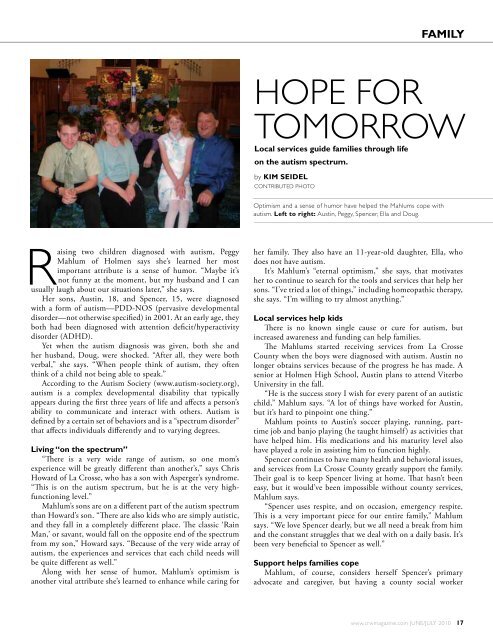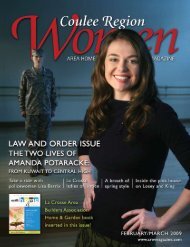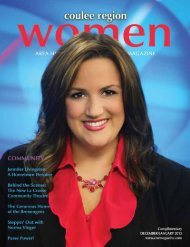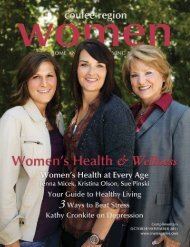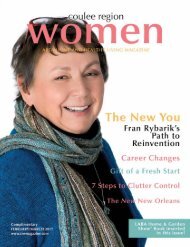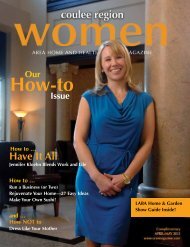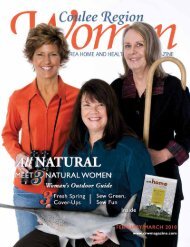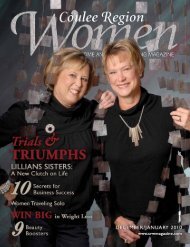June/July 2010 - Coulee Region Women's Magazine
June/July 2010 - Coulee Region Women's Magazine
June/July 2010 - Coulee Region Women's Magazine
- No tags were found...
Create successful ePaper yourself
Turn your PDF publications into a flip-book with our unique Google optimized e-Paper software.
FAMILYHope forTomorrowLocal services guide families through lifeon the autism spectrum.by Kim SeidelContributed PhotoOptimism and a sense of humor have helped the Mahlums cope withautism. Left to right: Austin, Peggy, Spencer, Ella and Doug.Raising two children diagnosed with autism, PeggyMahlum of Holmen says she’s learned her mostimportant attribute is a sense of humor. “Maybe it’snot funny at the moment, but my husband and I canusually laugh about our situations later,” she says.Her sons, Austin, 18, and Spencer, 15, were diagnosedwith a form of autism—PDD-NOS (pervasive developmentaldisorder—not otherwise specified) in 2001. At an early age, theyboth had been diagnosed with attention deficit/hyperactivitydisorder (ADHD).Yet when the autism diagnosis was given, both she andher husband, Doug, were shocked. “After all, they were bothverbal,” she says. “When people think of autism, they oftenthink of a child not being able to speak.”According to the Autism Society (www.autism-society.org),autism is a complex developmental disability that typicallyappears during the first three years of life and affects a person’sability to communicate and interact with others. Autism isdefined by a certain set of behaviors and is a “spectrum disorder”that affects individuals differently and to varying degrees.Living “on the spectrum”“There is a very wide range of autism, so one mom’sexperience will be greatly different than another’s,” says ChrisHoward of La Crosse, who has a son with Asperger’s syndrome.“This is on the autism spectrum, but he is at the very highfunctioninglevel.”Mahlum’s sons are on a different part of the autism spectrumthan Howard’s son. “There are also kids who are simply autistic,and they fall in a completely different place. The classic ‘RainMan,’ or savant, would fall on the opposite end of the spectrumfrom my son,” Howard says. “Because of the very wide array ofautism, the experiences and services that each child needs willbe quite different as well.”Along with her sense of humor, Mahlum’s optimism isanother vital attribute she’s learned to enhance while caring forher family. They also have an 11-year-old daughter, Ella, whodoes not have autism.It’s Mahlum’s “eternal optimism,” she says, that motivatesher to continue to search for the tools and services that help hersons. “I’ve tried a lot of things,” including homeopathic therapy,she says. “I’m willing to try almost anything.”Local services help kidsThere is no known single cause or cure for autism, butincreased awareness and funding can help families.The Mahlums started receiving services from La CrosseCounty when the boys were diagnosed with autism. Austin nolonger obtains services because of the progress he has made. Asenior at Holmen High School, Austin plans to attend ViterboUniversity in the fall.“He is the success story I wish for every parent of an autisticchild,” Mahlum says. “A lot of things have worked for Austin,but it’s hard to pinpoint one thing.”Mahlum points to Austin’s soccer playing, running, parttimejob and banjo playing (he taught himself ) as activities thathave helped him. His medications and his maturity level alsohave played a role in assisting him to function highly.Spencer continues to have many health and behavioral issues,and services from La Crosse County greatly support the family.Their goal is to keep Spencer living at home. That hasn’t beeneasy, but it would’ve been impossible without county services,Mahlum says.“Spencer uses respite, and on occasion, emergency respite.This is a very important piece for our entire family,” Mahlumsays. “We love Spencer dearly, but we all need a break from himand the constant struggles that we deal with on a daily basis. It’sbeen very beneficial to Spencer as well.”Support helps families copeMahlum, of course, considers herself Spencer’s primaryadvocate and caregiver, but having a county social workerwww.crwmagazine.com JUNE/JULY <strong>2010</strong> 17


